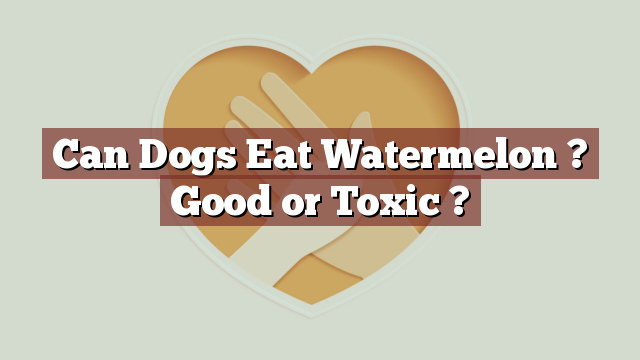Can dogs eat watermelon? Good or toxic?
Knowing which foods are safe for our furry friends is crucial for their overall health and well-being. One popular summer treat that many of us enjoy is watermelon. But can dogs also indulge in this juicy fruit? Let’s take a closer look at the nutritional value of watermelon, the potential risks and benefits for dogs, and what actions to take if your dog consumes it.
Nutritional Value of Watermelon: Vitamins, Minerals, and Fiber
Watermelon is a refreshing and hydrating fruit that is rich in essential vitamins, minerals, and fiber. It contains a high water content, making it a great choice to keep your dog hydrated in hot weather. Additionally, watermelon is packed with vitamins A, B6, and C, which are important for maintaining a healthy immune system. The fruit also contains potassium, which supports proper heart function, and dietary fiber, which aids digestion.
Can Dogs Eat Watermelon? Is it Safe or Toxic for Them?
Yes, dogs can eat watermelon, and it is safe for them when given in moderation. Watermelon is non-toxic and generally well-tolerated by dogs. However, it is crucial to remove the seeds and rind before feeding it to your furry friend. The seeds can cause intestinal blockage, and the rind may be difficult for dogs to digest. Therefore, it is best to serve only the flesh of the watermelon to your dog.
Potential Risks and Benefits of Dogs Eating Watermelon
While watermelon is generally safe for dogs, there are a few things to keep in mind. First, watermelon should be given as an occasional treat and not as a staple in their diet. Excessive consumption can lead to gastrointestinal upset, such as diarrhea or an upset stomach. Second, although watermelon is low in calories, it still contains natural sugars. Therefore, it’s important to consider your dog’s overall diet and calorie intake before offering them watermelon.
On the positive side, the high water content in watermelon can help keep your dog hydrated, especially during hot summer months. The vitamins and minerals present in the fruit can also contribute to their overall health and well-being, when consumed in moderation.
If Your Dog Eats Watermelon: Precautions and Actions to Take
If your dog accidentally consumes watermelon seeds or rind, it is important to monitor them closely. Watch for any signs of discomfort, vomiting, or changes in their bowel movements. If your dog experiences any of these symptoms, it is recommended to consult your veterinarian for guidance.
To prevent any potential risks, always remove the seeds and rind before feeding watermelon to your dog. Cut the fruit into bite-sized pieces to avoid choking hazards, and introduce it gradually into their diet to ensure they tolerate it well.
Conclusion: Moderation is Key, Consult Your Vet if Unsure
In conclusion, watermelon can be a safe and healthy treat for dogs when served in moderation. Its high water content and essential vitamins and minerals make it a refreshing snack, particularly during warmer months. However, it is important to remove the seeds and rind to prevent any potential digestive issues. If you have any concerns or questions about feeding watermelon to your dog, it is always best to consult your veterinarian for personalized advice and recommendations based on your dog’s specific needs.
Thank you for investing your time in exploring [page_title] on Can-Eat.org. Our goal is to provide readers like you with thorough and reliable information about various dietary topics. Each article, including [page_title], stems from diligent research and a passion for understanding the nuances of our food choices. We believe that knowledge is a vital step towards making informed and healthy decisions. However, while "[page_title]" sheds light on its specific topic, it's crucial to remember that everyone's body reacts differently to foods and dietary changes. What might be beneficial for one person could have different effects on another. Before you consider integrating suggestions or insights from "[page_title]" into your diet, it's always wise to consult with a nutritionist or healthcare professional. Their specialized knowledge ensures that you're making choices best suited to your individual health needs. As you navigate [page_title], be mindful of potential allergies, intolerances, or unique dietary requirements you may have. No singular article can capture the vast diversity of human health, and individualized guidance is invaluable. The content provided in [page_title] serves as a general guide. It is not, by any means, a substitute for personalized medical or nutritional advice. Your health should always be the top priority, and professional guidance is the best path forward. In your journey towards a balanced and nutritious lifestyle, we hope that [page_title] serves as a helpful stepping stone. Remember, informed decisions lead to healthier outcomes. Thank you for trusting Can-Eat.org. Continue exploring, learning, and prioritizing your health. Cheers to a well-informed and healthier future!

